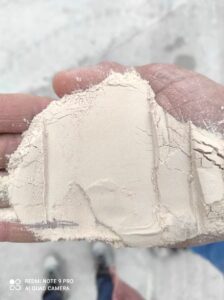Bentonite, a naturally occurring clay mineral primarily composed of montmorillonite,
has become an essential ingredient in soil conditioning and fertilizer applications. Known for its unique properties, bentonite enhances soil structure, improves nutrient retention, and acts as an effective carrier for fertilizers. This article explores the various uses and benefits of bentonite in soil conditioning and as a fertilizer carrier.

What is Bentonite?
Bentonite is a type of clay formed from the weathering of volcanic ash and is rich in minerals such as sodium, calcium, and magnesium. Its high swelling capacity and water absorption abilities make it an invaluable resource in agriculture. Bentonite is classified into two main types: sodium bentonite and calcium bentonite, each offering distinct benefits for soil health and fertility.
Benefits of Bentonite in Soil Conditioning
1. Improved Soil Structure
One of the primary benefits of bentonite in soil conditioning is its ability to improve soil structure. When mixed into the soil, bentonite particles help create aggregates, enhancing aeration and drainage. This improved structure allows roots to penetrate more easily and access water and nutrients, promoting healthy plant growth.
https://iranmineral.net/how-to-export-bentonite/
2. Enhanced Water Retention
Bentonite is renowned for its excellent water retention capabilities. It can absorb several times its weight in water, which helps maintain moisture levels in the soil. This characteristic is particularly beneficial in arid regions or during dry seasons, as it ensures that plants receive a consistent supply of water. The ability to retain moisture also reduces the need for frequent irrigation, making it a sustainable choice for farmers.
3. Nutrient Retention and Release
Bentonite acts as a natural nutrient reservoir, helping to retain essential nutrients in the soil. Its negatively charged particles attract positively charged nutrient ions, preventing them from leaching away. This nutrient retention ensures that plants have access to vital elements like potassium, calcium, and magnesium over an extended period, promoting optimal growth and yield.
Bentonite as a Fertilizer Carrier
1. Effective Fertilizer Carrier
Bentonite serves as an effective carrier for both granular and liquid fertilizers. Its ability to absorb and hold nutrients enhances the efficiency of fertilizers by preventing them from leaching away. When mixed with fertilizers, bentonite can improve their distribution in the soil, ensuring that nutrients reach the root zones where they are needed most.
The Benefits of Bentonite In Garden
2. Controlled Release of Nutrients
By using bentonite as a fertilizer carrier, farmers can achieve a controlled release of nutrients. This slow-release mechanism allows for a steady supply of nutrients to plants over time, reducing the risk of nutrient spikes that can lead to fertilizer burn. This controlled approach not only enhances plant health but also minimizes environmental impact by reducing nutrient runoff.
3. Eco-Friendly Solution
Bentonite is a naturally occurring material, making it an environmentally friendly choice for soil conditioning and fertilization. Its use reduces reliance on synthetic soil amendments and fertilizers, promoting sustainable agricultural practices. Additionally, bentonite’s natural properties contribute to improved soil health, supporting long-term agricultural productivity.

